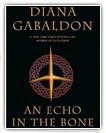Dragonfly In Amber - Gabaldon Diana (читать книги бесплатно полностью без регистрации сокращений txt) 📗
“Madame!” I turned at the cry, to find Fergus at my elbow, beaming up at me, a square-toothed grin on his sallow face.
“Madame! Is it not wonderful? Milord has received pardon for his men – a messenger came from Stirling this morning, with the order to release them, and we are ordered at once to join milord at Stirling!”
I hugged him, grinning a bit myself. “That is wonderful, Fergus.” A few of the men had noticed me, and were beginning to turn to me, smiling and plucking at each other’s sleeves. An air of exhilaration and excitement filled the small room. Murtagh, perched on the bedstead like the Gnome King on a toadstool, saw me then, and smiled – an expression which rendered him virtually unrecognizable, so much did it transform his face.
“Will Mr. Murtagh take the men to Stirling?” Fergus asked. He had received a whinger, or short sword, as his share of the weaponry, and was practicing drawing and sheathing it as he spoke.
I met Murtagh’s eye and shook my head. After all, I thought, if Jenny Cameron could lead her brother’s men to Glenfinnan, I could take my husband’s troops to Stirling. And just let Lord George and His Highness try to disregard my news, delivered in person.
“No,” I said. “I will.”
43 FALKIRK
I could feel the men close by, all around me in the dark. There was a piper walking next to me; I could hear the creak of the bag under his arm and see the outline of the drones, poking out behind. They moved as he walked, so that he seemed to be carrying a small, feebly struggling animal.
I knew him, a man named Labhriunn MacIan. The pipers of the clans took it in turns to call the dawn at Stirling, walking to and fro in the encampment with the piper’s measured stride, so that the wail of the drones bounced from the flimsy tents, calling all within to the battle of the new day.
Again in the evening a single piper would come out, strolling slow across the yard, and the camp would stop to listen, voices stilling and the glow of the sunset fading from the tents’ canvas. The high, whining notes of the pibroch called down the shadows from the moor, and when the piper was done, the night had come.
Evening or morning, Labhriunn MacIan played with his eyes closed, stepping sure and slow across the yard and back, elbow tight on the bag and his fingers lively on the chanters’ holes. Despite the cold, I sat sometimes to watch in the evenings, letting the sound drive its spikes through my heart. MacIan paced to and fro, ignoring everything around him, making his turns on the ball of his foot, pouring his being out through his chanter.
There are the small Irish pipes, used indoors for making music, and the Great Northern pipes, used outdoors for reveille, and for calling of clans to order, and the spurring of men to battle. It was the Northern pipes that MacIan played, walking to and fro with his eyes shut tight.
Rising from my seat as he finished one evening, I waited while he pressed the last of the air from his bag with a dying wail, and fell in alongside him as he came in through Stirling’s gate with a nod to the guard.
“Good e’en to ye, Mistress,” he said. His voice was soft, and his eyes, now open, softer still with the unbroken spell of his playing still on him.
“Good evening to you, MacIan,” I said. “I wondered, MacIan, why do you play with your eyes tight shut?”
He smiled and scratched his head, but answered readily enough.
“I suppose it is because my grandsire taught me, Mistress, and he was blind. I see him always when I play, pacing the shore with his beard flying in the wind and his blind eyes closed against the sting of the sand, hearing the sound of the pipes come down to him off the rocks of the cliffside and knowing from that where he was in his walk.”
“So you see him, and you play, too, to the cliffs and the sea? From where do you come, MacIan?” I asked. His speech was low and sibilant, even more than that of most Highlanders.
“It is from the Shetlands, Mistress,” he replied, making the last word almost “Zetlands.” “A long way from here.” He smiled again, and bowed to me as we came to the guest quarters, where I would turn. “But then, I am thinking that you have come farther still, Mistress.”
“That’s’true,” I said. “Good night, MacIan.”
Later that week, I wondered whether his skill at playing unseeing would help him, here in the dark. A large body of men moving makes a good bit of noise, no matter how quietly they go, but I thought any echoes they created would be drowned in the howl of the rising wind. The night was moonless, but the sky was light with clouds, and an icy sleet was falling, stinging my cheeks.
The men of the Highland army covered the ground in small groups of ten or twenty, moving in uneven bumps and patches, as though the earth thrust up small hillocks here and there, or as though the groves of larch and alder were walking through the dark. My news had not come unsupported; Ewan Cameron’s spies had reported Hawley’s moves as well, and the Scottish army was now on its way to meet him, somewhere south of Stirling Castle.
Jamie had given up urging me to go back. I had promised to stay out of the way, but if there was a battle to be fought, then the army’s physicians must be at hand afterward. I could tell when his attention shifted to his men, and the prospects ahead, by the sudden cock of his head. On Donas, he sat high enough to be visible as a shadow, even in the dark, and when he threw up an arm, two smaller shadows detached themselves from the moving mass and came up beside his stirrup. There was a moment’s whispered conversation; then he straightened in his saddle and turned to me.
“The scouts say we’ve been seen; English guards have gone flying for Callendar House, to warn General Hawley. We shallna wait longer; I’m taking my men and circling beyond Dougal’s troops to the far side of Falkirk Hill. We’ll come down from behind as the MacKenzies come in from the west. There’s a wee kirk up the hill to your left, maybe a quarter-mile. That’s your place, Sassenach. Ride there now, and stay.” He groped for my arm in the darkness, found it, and squeezed.
“I shall come for ye when I can, or send Murtagh if I can’t. If things should go wrong, go into the kirk and claim sanctuary there. It’s the best I can think of.”
“Don’t worry about me,” I said. My lips were cold, and I hoped my voice didn’t sound as shaky as I felt. I bit back the “Be careful” that would have been my next words, and contented myself with touching him quickly, the cold surface of his cheek hard as metal under my hand, and the brush of a lock of hair, cold and smooth as a deer’s pelt.
I reined to the left, picking my way slowly as the oncoming men flowed around me. The gelding was excited by the stir; he tossed his head, snorting, and fidgeted under me. I pulled him up sharply, as Jamie had taught me, and kept a close rein as the ground sloped suddenly up beneath the horse’s hooves. I glanced back once, but Jamie had disappeared into the night, and I needed all my attention to find the church in the dark.
It was a tiny building, stone with a thatched roof, crouched in a small depression of the hill, like a cowering animal. I felt a strong feeling of kinship with it. The English watchfires were visible from here, glimmering through the sleet, and I could hear shouting in the distance – Scots or English, I couldn’t tell.
Then the pipes began, a thin, eerie scream in the storm. There were discordant shrieks, rising unearthly from several different places on the hill. Having seen it before at close hand, I could imagine the pipers blowing up their bags, chests inflating with quick gasps and blue lips clamped tight on the chanters’ stems, cold-stiff fingers fumbling to guide the blowing into coherence.




